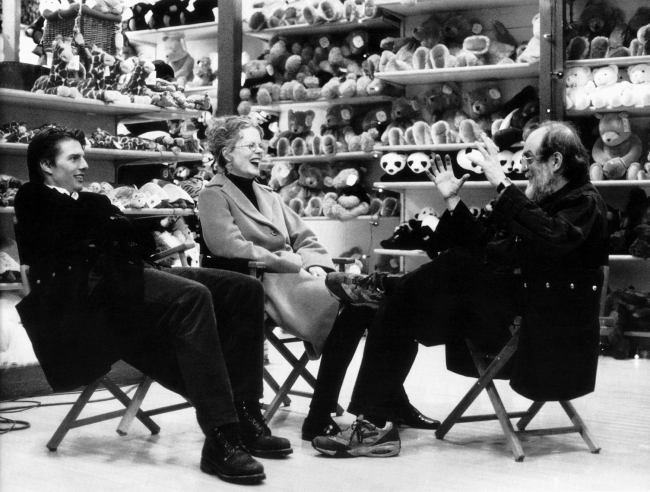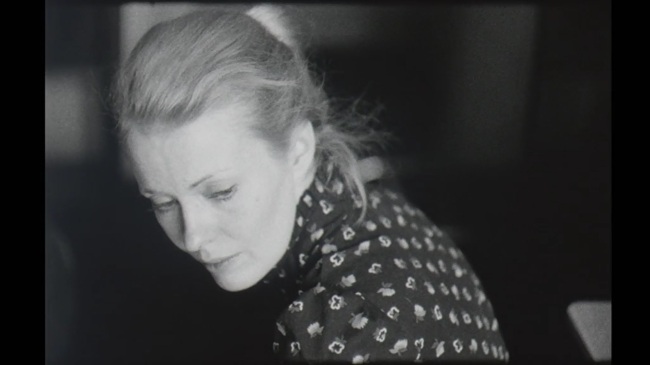Two legendary filmmakers -- Stanley Kubrick and Philippe Garrel -- are the subjects of museum exhibitions, exploring the film genre as a complex form of art.
The Seoul Museum of Art, in partnership with Hyundai Card, is holding a retrospective of American film director Stanley Kubrick (1928-1999), a touring exhibition that began in Frankfurt in 2004.
Drawing on the extensive archives from Kubrick’s home and workplace, the exhibition features some 1,000 photographs, shooting schedules, scripts, letters, props, costumes and cameras used by the director during his lifetime of film production.
 |
Stanley Kubrick with Tom Cruise and Nicole Kidman on the set of 1999 film “Eyes Wide Shut” (© Warner Bros. Entertainment Inc. Photo: Manuel Harlan) |
“It goes back to 2002 when Jan Harlan and I were invited to Kubrick’s house in a London suburb. We saw an extensive collection of his lifetime movie production materials. We sent over archive experts who spent eight months sorting them out,” said Hans-Peter Reichmann, senior curator of the Deutsches Filmmuseum at a press conference last week.
The exhibition, which has already toured more than 11 countries, including Australia, Switzerland, France, the U.S., Brazil and Mexico, covers Kubrick’s films spanning from the 1950s to the 1990s. The scripts, shooting schedules and photographs of the actors and Kubrick on movie sets offer behind-the-scenes glimpses of masterpieces such as “Spartacus,” “Lolita,” “Dr. Strangelove” and “A Clockwork Orange.”
Books and materials Kubrick referenced for his film projects offer an understanding of how the director worked to achieve a high level of achievement in his films.
“He’s often called a perfectionist. That’s an absolute necessity for any great artist. What I have observed is the necessity of being critical of himself and how much love, care and details went into his films,” said Jan Harlan, producer and the brother of Christiane Kubrick, director Kubrick’s widow.
Kubrick used the Zeiss lens designed for NASA to film scenes for the period film “Barry Lyndon” set in the 18th century. For the 1968 science fiction film “2001: Space Odyssey,” he created realistic images of spaceships and zero-gravity movements by astronauts using experimental and innovative techniques. The film is credited with setting the direction for future sci-fi movie special effects.
Kubrick’s quest for perfection in images and narratives has influenced today’s artists who seek to combine diverse mediums and multimedia to explore the potential of art.
The Stanley Kubrick retrospective runs until March 13 at the Seoul Museum of Art. For more information, visit
www.sema.seoul.go.kr.
The Philippe Garrel retrospective at the National Museum of Modern and Contemporary Art, Korea highlights the French filmmaker’s visual experimentations.
Garrel, associated with La Nouvelle Vague (the French New Wave) movement, and winner of several awards at the Cannes Film Festival and Venice Film Festival, is known for abstract experimental films that reflect dramatic emotions and social and political situations.
“Garrel has been making films with experimental attempts in the most classical form,” said Kim Eun-hee, curator of the retrospective.
The museum is presenting Garrel’s earlier black-and-white movies “Le Revelateur,” “Actua 1” and “Les Hautes Solitudes” in the form of media installations played on a 35-milimeter projector.
 |
A scene from "Les Hautes Solitudes" by Philippe Garrel (MMCA) |
The 1974 film “Les Hautes Solitudes” is screened on two separate screens facing each other to intensify the emotions of the female protagonists in an intimate visual language. The 1968 film “Actua 1,” thought to been lost for 47 years, was recovered for this exhibition.
The museum is also screening 16 major films by Garrel -- 13 of them restored digitally -- at its movie theater.
The Philippe Garrel retrospective runs until Feb. 28. For more information, visit
www.mmca.go.kr.
By Lee Woo-young (
wylee@heraldcorp.com)








![[Today’s K-pop] Blackpink’s Jennie, Lisa invited to Coachella as solo acts](http://res.heraldm.com/phpwas/restmb_idxmake.php?idx=644&simg=/content/image/2024/11/21/20241121050099_0.jpg)
